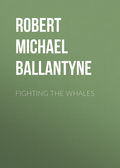
Robert Michael Ballantyne
Dusty Diamonds Cut and Polished: A Tale of City Arab Life and Adventure
At this point the company were startled by another knock, and so persuaded was Mrs Twitter that it must be Sammy himself, that she rushed out of the room, opened the door, and almost flung herself into the arms of Number 666.
“I—I—beg your pardon, Mr Scott, I thought that—”
“No harm done, ma’am,” said Giles. “May I come in?”
“Certainly, and most welcome.”
When the tall constable bowed his head to pass under the ridiculously small doorway, and stood erect in the still more ridiculously small parlour, it seemed as though the last point of capacity had been touched, and the walls of the room must infallibly burst out. But they did not! Probably the house had been built before domiciles warranted to last twenty years had come into fashion.
“You have found him!” exclaimed Mrs Twitter, clasping her hands and looking up in Giles’s calm countenance with tearful eyes.
“Yes, ma’am, I am happy to tell you that we have at last traced him. I have just left him.”
“And does he know you have come here? Is he expecting us?” asked the poor woman breathlessly.
“Oh! dear, no, ma’am, I rather think that if he knew I had come here, he would not await my return, for the young gentleman does not seem quite willing to come home. Indeed he is not quite fit; excuse me.”
“How d’you know he’s not willing?” demanded Mr Twitter, who felt a rising disposition to stand up for Sammy.
“Because I heard him say so, sir. I went into the place where he was, to look for some people who are wanted, and saw your son sitting with a well-known rough of the name of North, who has become a changed man, however, and has put on the blue ribbon. I knew North well, and recognised your son at once. North seemed to have been trying to persuade your boy to return,” (“bless him! bless him!” from Mrs Twitter), “for I heard him say as I passed—‘Oh! no, no, no, I can never return home!’”
“Where is he? Take me to him at once. My bonnet and shawl, Molly!”
“Pardon me, ma’am,” said Giles. “It is not a very fit place for a lady—though there are some ladies who go to low lodging-houses regularly to preach; but unless you go for that purpose it—”
“Yes, my dear, it would be quite out of place,” interposed Twitter. “Come, it is my duty to go to this place. Can you lead me to it, Mr Scott?”
“Oh! and I should like to go too—so much, so very much!”
It was little Di who spoke, but her father said that the idea was preposterous.
“Pardon me, Sir Richard,” said Mr Seaward, “this happens to be my night for preaching in the common lodging-house where Mr Scott says poor Sam is staying. If you choose to accompany me, there is nothing to prevent your little daughter going. Of course it would be as well that no one whom the boy might recognise should accompany us, but his father might go and stand at the door outside, while the owner of the lodging might be directed to tell Sam that some one wishes to see him.”
“Your plan is pretty good, but I will arrange my plans myself,” said Mr Twitter, who suddenly roused himself to action with a degree of vigour that carried all before it. “Go and do your own part, Mr Seaward. Give no directions to the proprietor of the lodging, and leave Sammy to me. I will have a cab ready for him, and his mother in the cab waiting, with a suit of his own clothes. Are you ready?”
“Quite ready,” said the missionary, amused as well as interested by the good man’s sudden display of resolution. Mrs Twitter, also, was reduced to silence by surprise, as well as by submission. Sir Richard agreed to go and take Di with him, if Giles promised to hold himself in readiness within call.
“You see,” he said, “I have been in similar places before now, but—not with my little child!”
As for Loper, Larrabel, Crackaby, Stickler, and Company—feeling that it would be improper to remain after the host and hostess were gone; that it would be equally wrong to offer to go with them, and quite inappropriate to witness the home-coming,—they took themselves off, but each resolved to flutter unseen in the neighbourhood until he, or she, could make quite sure that the prodigal had returned.
It was to one of the lowest of the common lodging-houses that Sam Twitter the younger had resorted on the night he had been discovered by Number 666. That day he had earned sixpence by carrying a carpet bag to a railway station. One penny he laid out in bread, one penny in cheese. With the remaining fourpence he could purchase the right to sit in the lodging-house kitchen, and to sleep in a bed in a room with thirty or forty homeless ones like himself.
On his way to this abode of the destitute, he was overtaken by a huge man with a little bit of blue ribbon in his button-hole.
“Hallo! young feller,” exclaimed the man, “you’re the chap that was livin’ wi’ Ned Frog the night I called to see ’im—eh! Sam Twitter, ain’t you?”
“Yes,” said young Sam, blushing scarlet with alarm at the abruptness of the question. “Yes, I am. T–Twitter is my name. You’re the man that gave him the Bible, are you not, whom he turned out of his house for tryin’ to speak to him about his soul?”
“The same, young feller. That’s me, an’ Reggie North is my name. He’d ’ave ’ad some trouble to turn me out once, though, but I’ve given up quarrellin’ and fightin’ now, havin’ enlisted under the banner of the Prince of Peace,” replied the man, who was none other than our Bible-salesman, the man who contributed the memorable speech—“Bah!” and “Pooh!” at the Gospel-temperance meeting. “Where are you going?”
Sam, who never could withhold information or retain a secret if asked suddenly, gave the name of the common lodging-house to which he was bound.
“Well, I’m going there too, so come along.”
Sam could not choose but go with the man. He would rather have been alone, but could not shake him off.
Entering, they sat down at a table together near the kitchen fire, and North, pulling out of his pocket a small loaf, cut it in two and offered Sam half.
Several men were disputing in the box or compartment next to them, and as they made a great noise, attracting the attention of all around, North and his friend Sam were enabled the more easily to hold confidential talk unnoticed, by putting their heads together and chatting low as they ate their frugal meal.
“What made you leave Ned?” asked North.
“How did you know I’d left him?”
“Why, because if you was still with him you wouldn’t be here!”
This was so obvious that Sam smiled; but it was a sad apology for a smile.
“I left him, because he constantly offered me beer, and I’ve got such an awful desire for beer now, somehow, that I can’t resist it, so I came away. And there’s no chance of any one offering me beer in this place.”
“Not much,” said North, with a grin. “But, young feller,” (and there was something earnestly kind in the man’s manner here), “if you feel an awful desire for drink, you’d better put on this.”
He touched his bit of blue ribbon.
“No use,” returned Sam, sorrowfully, “I once put it on, and—and—I’ve broke the pledge.”
“That’s bad, no doubt; but what then?” returned North; “are we never to tell the truth any more ’cause once we told a lie? Are we never to give up swearin’ ’cause once we uttered a curse? The Lord is able to save us, no matter how much we may have sinned. Why, sin is the very thing He saves us from—if we’ll only come to Him.”
Sam shook his head, but the manner of the man had attracted him, and eventually he told all his story to him. Reggie North listened earnestly, but the noise of the disputants in the next box was so great that they rose, intending to go to a quieter part of the large room. The words they heard at the moment, however, arrested them. The speaker was, for such a place, a comparatively well-dressed man, and wore a top-coat. He was discoursing on poverty and its causes.
“It is nothing more nor less,” he said, with emphasis, “than the absence of equality that produces so much poverty.”
“Hear! hear!” cried several voices, mingled with which, however, were the scoffing laughs of several men who knew too well and bitterly that the cause of their poverty was not the absence of equality, but, drink with improvidence.
“What right,” asked the man, somewhat indignantly, “what right has Sir Crossly Cowel, for instance, the great capitalist, to his millions that ’e don’t know what to do with, when we’re starvin’?” (Hear!) “He didn’t earn these millions; they was left to ’im by his father, an’ he didn’t earn ’em, nor did his grandfather, or his great-grandfather, and so, back an’ back to the time of the robber who came over with William—the greatest robber of all—an’ stole the money, or cattle, from our forefathers.” (Hear! hear!) “An’ what right has Lord Lorrumdoddy to the thousands of acres of land he’s got?” (‘Ha! you may say that!’ from an outrageously miserable-looking man, who seemed too wretched to think, and only spoke for a species of pastime.) “What right has he, I say, to his lands? The ministers of religion, too, are to be blamed, for they toady the rich and uphold the unjust system. My friends, it is these rich capitalists and landowners who oppress the people. What right have they, I ask again, to their wealth, when the inmates of this house, and thousands of others, are ill-fed and in rags? If I had my way,” (Hear! hear! and a laugh), “I would distribute the wealth of the country, and have no poor people at all such as I see before me—such as this poor fellow,” (laying his hand on the shoulder of the outrageously miserable man, who said ‘Just so’ feebly, but seemed to shrink from his touch). “Do I not speak the truth?” he added, looking round with the air of a man who feels that he carries his audience with him.
“Well, mister, I ain’t just quite clear about that,” said Reggie North, rising up and looking over the heads of those in front of him. There was an immediate and complete silence, for North had both a voice and a face fitted to command attention. “I’m not a learned man, you see, an’ hain’t studied the subjec’, but isn’t there a line in the Bible which says, ‘Blessed are they that consider the poor?’ Now it do seem to me that if we was all equally rich, there would be no poor to consider, an’ no rich to consider ’em!”
There was a considerable guffaw at this, and the argumentative man was about to reply, but North checked him with—
“’Old on, sir, I ain’t done yet. You said that Sir Cowley Cross—”
“Crossly Cowel,” cried his opponent, correcting.
“I ax your pardon; Sir Crossly Cowel—that ’e ’ad no right to ’is millions, ’cause ’e didn’t earn ’em, and because ’is father left ’em to ’im. Now, I ’ad a grandmother with one eye, poor thing—but of coorse that’s nothin’ to do wi’ the argiment—an’ she was left a fi’ pun note by ’er father as ’ad a game leg—though that’s nothin’ to do wi’ the argiment neither. Now, what puzzles me is, that if Sir Cow—Cross—”
A great shout of laughter interrupted North here, for he looked so innocently stupid, that most of the audience saw he was making game of the social reformer.
“What puzzles me is,” continued North, “that if Sir Crossly Cowel ’as no right to ’is millions, my old grandmother ’ad no right to ’er fi’ pun note!” (“Hear, hear,” and applause.) “I don’t know nothin’ about that there big thief Willum you mentioned, nor yet Lord Lorrumdoddy, not bein’ ’ighly connected, you see, mates, but no doubt this gentleman believes in ’is principles—”
“Of course I does,” said the social reformer indignantly.
“Well, then,” resumed North, suddenly throwing off his sheepish look and sternly gazing at the reformer while he pointed to the outrageously miserable man, who had neither coat, vest, shoes, nor socks, “do you see that man? If you are in earnest, take off your coat and give it to him. What right have you to two coats when he has none?”
The reformer looked surprised, and the proposal was received with loud laughter; all the more that he seemed so little to relish the idea of parting with one of his coats in order to prove the justice of his principles, and his own sincerity.
To give his argument more force, Reggie North took a sixpence from his pocket and held it up.
“See here, mates, when I came to this house I said to myself, ‘The Lord ’as given me success to-day in sellin’ His word,’—you know, some of you, that I’m a seller of Bibles and Testaments?”
“Ay, ay, old boy. We know you,” said several voices.
“And I wasn’t always that,” added North.
“That’s true, anyhow,” said a voice with a laugh.
“Well. For what I was, I might thank drink and a sinful heart. For what I am I thank the Lord. But, as I was goin’ to say, I came here intendin’ to give this sixpence—it ain’t much, but it’s all I can spare—to some poor feller in distress, for I practise what I preach, and I meant to do it in a quiet way. But it seems to me that, seein’ what’s turned up, I’ll do more good by givin’ it in a public way—so, there it is, old man,” and he put the sixpence on the table in front of the outrageously miserable man, who could hardly believe his eyes.
The change to an outrageously jovial man, with the marks of misery still strong upon him, was worthy of a pantomime, and spoke volumes; for, small though the sum might seem to Sir Crossly Cowel, or Lord Lorrumdoddy, it represented a full instead of an empty stomach and a peaceful instead of a miserable night to one wreck of humanity.
The poor man swept the little coin into his pocket and rose in haste with a “thank ’ee,” to go out and invest it at once, but was checked by North.
“Stop, stop, my fine fellow! Not quite so fast. If you’ll wait till I’ve finished my little business here, I’ll take you to where you’ll get some warm grub for nothin’, and maybe an old coat too.” Encouraged by such brilliant prospects, the now jovially-miserable man sat down and waited while North and Sam went to a more retired spot near the door, where they resumed the confidential talk that had been interrupted.
“The first thing you must do, my boy,” said North, kindly, “is to return to your father’s ’ouse; an’ that advice cuts two ways—’eaven-ward an’ earth-ward.”
“Oh! no, no, no, I can never return home,” replied Sam, hurriedly, and thinking only of the shame of returning in his wretched condition to his earthly father.
It was at this point that the couple had come under the sharp stern eye of Number 666, who, as we have seen, went quietly out and conveyed the information direct to the Twitter family.
Chapter Twenty Four.
The Returning Prodigal
For a considerable time the Bible-seller plied Sam with every argument he could think of in order to induce him to return home, and he was still in the middle of his effort when the door opened, and two young men of gentlemanly appearance walked in, bearing a portable harmonium between them.
They were followed by one of the ladies of the Beehive, who devote all their time—and, may we not add, all their hearts—to the rescue of the perishing. Along with her came a tall, sweet-faced girl. She was our friend Hetty Frog, who, after spending her days at steady work, spent some of her night hours in labours of love. Hetty was passionately fond of music, and had taught herself to play the harmonium sufficiently to accompany simple hymns.
After her came the missionary, whose kind face was familiar to most of the homeless ones there. They greeted him with good-natured familiarity, but some of their faces assumed a somewhat vinegar aspect when the tall form of Sir Richard Brandon followed Seaward.
“A bloated haristocrat!” growled one of the men.
“Got a smart little darter, anyhow,” remarked another, as Di, holding tight to her father’s hand, glanced from side to side with looks of mingled pity and alarm.
For poor little Di had a not uncommon habit of investing everything in couleur de rose, and the stern reality which met her had not the slightest tinge of that colour. Di had pictured to herself clean rags and picturesque poverty. The reality was dirty rags and disgusting poverty. She had imagined sorrowful faces. Had she noted them when the missionary passed, she might indeed have seen kindly looks; but when her father passed there were only scowling faces, nearly all of which were unshaven and dirty. Di had not thought at all of stubbly beards or dirt! Neither had she thought of smells, or of stifling heat that it was not easy to bear. Altogether poor little Di was taken down from a height on that occasion to which she never again attained, because it was a false height. In after years she reached one of the true heights—which was out of sight higher than the false one!
There was something very businesslike in these missionaries, for there was nothing of the simply amateur in their work—like the visit of Di and her father. They were familiar with the East-end mines; knew where splendid gems and rich gold were to be found, and went about digging with the steady persistence of the labourer, coupled, however, with the fire of the enthusiast.
They carried the harmonium promptly to the most conspicuous part of the room, planted it there, opened it, placed a stool in front of it, and one of the brightest diamonds from that mine—in the person of Hetty Frog—sat down before it. Simply, and in sweet silvery tones, she sang—“Come to the Saviour.”
The others joined—even Sir Richard Brandon made an attempt to sing—as he had done on a previous occasion, but without much success, musically speaking. Meanwhile, John Seaward turned up the passage from which he had prepared to speak that evening. And so eloquent with nature’s simplicity was the missionary, that the party soon forgot all about the Twitters while the comforting Gospel was being urged upon the unhappy creatures around.
But we must not forget the Twitters. They are our text and sermon just now!
Young Sam Twitter had risen with the intention of going out when the missionary entered, for words of truth only cut him to the heart. But his companion whispered him to wait a bit. Soon his attention was riveted.
While he sat there spell-bound, a shabby-genteel man entered and sat down beside him. He wore a broad wide-awake, very much slouched over his face, and a coat which had once been fine, but now bore marks of having been severely handled—as if recently rubbed by a drunken wearer on whitewashed and dirty places. The man’s hands were not so dirty, however, as one might have expected from his general appearance, and they trembled much. On one of his fingers was a gold ring. This incongruity was lost on Sam, who was too much absorbed to care for the new comer, and did not even notice that he pushed somewhat needlessly close to him.
These things were not, however, lost on Reggie North, who regarded the man with some surprise, not unmixed with suspicion.
When, after a short time, however, this man laid his hand gently on that of Sam and held it, the boy could no longer neglect his eccentricities. He naturally made an effort to pull the hand away, but the stranger held it fast. Having his mind by that time entirely detached from the discourse of the missionary, Sam looked at the stranger in surprise, but could not see his face because of the disreputable wide-awake which he wore. But great was his astonishment, not to say alarm, when he felt two or three warm tears drop on his hand.
Again he tried to pull it away, but the strange man held it tighter. Still further, he bent his head over it and kissed it.
A strange unaccountable thrill ran through the boy’s frame. He stooped, looked under the brim of the hat, and beheld his father!
“Sammy—dear, dear Sammy,” whispered the man, in a husky voice.
But Sammy could not reply. He was thunderstruck. Neither could his father speak, for he was choking.
But Reggie North had heard enough. He was quick-witted, and at once guessed the situation.
“Now then, old gen’lm’n,” he whispered, “don’t you go an’ make a fuss, if you’re wise. Go out as quiet as you came in, an’ leave this young ’un to me. It’s all right. I’m on your side.”
Samuel Twitter senior was impressed with the honesty of the man’s manner, and the wisdom of his advice. Letting go the hand, after a parting squeeze, he rose up and left the room. Two minutes later, North and Sammy followed.
They found the old father outside, who again grasped his son’s hand with the words, “Sammy, my boy—dear Sammy;” but he never got further than that.
Number 666 was there too.
“You’ll find the cab at the end of the street, sir,” he said, and next moment Sammy found himself borne along—not unwillingly—by North and his father.
A cab door was opened. A female form was seen with outstretched arms.
“Mother!”
“Sammy—darling—”
The returning prodigal disappeared into the cab. Mr Twitter turned round.
“Thank you. God bless you, whoever you are,” he said, fumbling in his vest pocket; having forgotten that he represented an abject beggar, and had no money there.
“No thanks to me, sir. Look higher,” said the Bible-seller, thrusting the old gentleman almost forcibly into the vehicle. “Now then, cabby, drive on.”
The cabby obeyed. Having already received his instructions he did not drive home. Where he drove to is a matter of small consequence. It was to an unknown house, and a perfect stranger to Sammy opened the door. Mrs Twitter remained in the cab while Sammy and his father entered the house, the latter carrying a bundle in his hand. They were shown into what the boy must have considered—if he considered anything at all just then—a preposterously small room.
The lady of the house evidently expected them, for she said, “The bath is quite ready, sir.”
“Now, Sammy,—dear boy,” said Mr Twitter, “off with your rags—and g–git into that b–bath.”
Obviously Mr Twitter did not speak with ease. In truth it was all he could do to contain himself, and he felt that his only chance of bearing up was to say nothing more than was absolutely necessary in short ejaculatory phrases. Sammy was deeply touched, and began to wash his dirty face with a few quiet tears before taking his bath.
“Now then, Sammy—look sharp! You didn’t use—to—be—so—slow! eh?”
“No, father. I suppose it—it—is want of habit. I haven’t undressed much of late.”
This very nearly upset poor Mr Twitter. He made no reply, but assisted his son to disrobe with a degree of awkwardness that tended to delay progress.
“It—it’s not too hot—eh?”
“Oh! no, father. It’s—it’s—v–very nice.”
“Go at it with a will, Sammy. Head and all, my boy—down with it. And don’t spare the soap. Lots of soap here, Sammy—no end of soap!”
The truth of which Mr Twitter proceeded to illustrate by covering his son with a lather that caused him quickly to resemble whipped cream.
“Oh! hold on, father, it’s getting into my eyes.”
“My boy—dear Sammy—forgive me. I didn’t quite know what I was doing. Never mind. Down you go again, Sammy—head and all. That’s it. Now, that’s enough; out you come.”
“Oh! father,” said the poor boy, while invisible tears trickled over his wet face, as he stepped out of the bath, “it’s so good of you to forgive me so freely.”
“Forgive you, my son! forgive! why, I’d—I’d—” He could say no more, but suddenly clasped Sammy to his heart, thereby rendering his face and person soap-suddy and wet to a ridiculous extent.
Unclasping his arms and stepping back, he looked down at himself.
“You dirty boy! what d’you mean by it?”
“It’s your own fault, daddy,” replied Sam, with a hysterical laugh, as he enveloped himself in a towel.
A knock at the bath-room door here produced dead silence.
“Please, sir,” said a female voice, “the lady in the cab sends to say that she’s gettin’ impatient.”
“Tell the lady in the cab to drive about and take an airing for ten minutes,” replied Mr Twitter with reckless hilarity.
“Yes, sir.”
“Now, my boy, here’s your toggery,” said the irrepressible father, hovering round his recovered son like a moth round a candle—“your best suit, Sammy; the one you used to wear only on Sundays, you extravagant fellow.”
Sammy put it on with some difficulty from want of practice, and, after combing out and brushing his hair, he presented such a changed appearance that none of his late companions could have recognised him. His father, after fastening up his coat with every button in its wrong hole, and causing as much delay as possible by assisting him to dress, finally hustled him down-stairs and into the cab, where he was immediately re-enveloped by Mrs Twitter.
He was not permitted to see any one that night, but was taken straight to his room, where his mother comforted, prayed with, fed and fondled him, and then allowed him to go to bed.
Next morning early—before breakfast—Mrs Twitter assembled all the little Twitters, and put them on chairs in a row—according to order, for Mrs Twitter’s mind was orderly in a remarkable degree. They ranged from right to left thus:—
Molly, Willie, Fred, Lucy, and Alice—with Alice’s doll on a doll’s chair at the left flank of the line.
“Now children,” said Mrs Twitter, sitting down in front of the row with an aspect so solemn that they all immediately made their mouths very small and their eyes very large—in which respect they brought themselves into wonderful correspondence with Alice’s doll. “Now children, your dear brother Sammy has come home.”
“Oh! how nice! Where has he been? What has he seen? Why has he been away so long? How jolly!” were the various expressions with which the news was received.
“Silence.”
The stillness that followed was almost oppressive, for the little Twitters had been trained to prompt obedience. To say truth they had not been difficult to train, for they were all essentially mild.
“Now, remember, when he comes down to breakfast you are to take no notice whatever of his having been away—no notice at all.”
“Are we not even to say good-morning or kiss him, mamma?” asked little Alice with a look of wonder.
“Dear child, you do not understand me. We are all charmed to see Sammy back, and so thankful—so glad—that he has come, and we will kiss him and say whatever we please to him except,” (here she cast an awful eye along the line and dropped her voice), “except ask him where—he—has—been.”
“Mayn’t we ask him how he liked it, mamma?” said Alice.
“Liked what, child?”
“Where he has been, mamma.”
“No, not a word about where he has been; only that we are so glad, so very glad, to see him back.”
Fred, who had an argumentative turn of mind, thought that this would be a rather demonstrative though indirect recognition of the fact that Sammy had been somewhere that was wrong, but, having been trained to unquestioning obedience, Fred said nothing.
“Now, dolly,” whispered little Alice, bending down, “’member dat—you’re so glad Sammy’s come back; mustn’t say more—not a word more.”
“It is enough for you to know, my darlings,” continued Mrs Twitter, “that Sammy has been wandering and has come back.”
“Listen, Dolly, you hear? Sammy’s been wandering an’ come back. Dat’s ’nuff for you.”
“You see, dears,” continued Mrs Twitter, with a slightly perplexed look, caused by her desire to save poor Sammy’s feelings, and her anxiety to steer clear of the slightest approach to deception, “you see, Sammy has been long away, and has been very tired, and won’t like to be troubled with too many questions at breakfast, you know, so I want you all to talk a good deal about anything you like—your lessons,—for instance, when he comes down.”
“Before we say good-morning, mamma, or after?” asked Alice, who was extremely conscientious.
“Darling child,” exclaimed the perplexed mother, “you’ll never take it in. What I want to impress on you is—”
She stopped, suddenly, and what it was she meant to impress we shall never more clearly know, for at that moment the foot of Sammy himself was heard on the stair.
“Now, mind, children, not a word—not—a—word!”
The almost preternatural solemnity induced by this injunction was at once put to flight by Sammy, at whom the whole family flew with one accord and a united shriek—pulling him down on a chair and embracing him almost to extinction.
Fortunately for Sammy, and his anxious mother, that which the most earnest desire to obey orders would have failed to accomplish was brought about by the native selfishness of poor humanity, for, the first burst of welcome over, Alice began an elaborate account of her Dolly’s recent proceedings, which seemed to consist of knocking her head against articles of furniture, punching out her own eyes and flattening her own nose; while Fred talked of his latest efforts in shipbuilding; Willie of his hopes in regard to soldiering, and Lucy of her attempts to draw and paint.
Mr and Mrs Twitter contented themselves with gazing on Sammy’s somewhat worn face, and lying in watch, so that, when Alice or any of the young members of the flock seemed about to stray on the forbidden ground, they should be ready to descend, like two wolves on the fold, remorselessly change the subject of conversation, and carry all before them.
Thus tenderly was that prodigal son received back to his father’s house.







